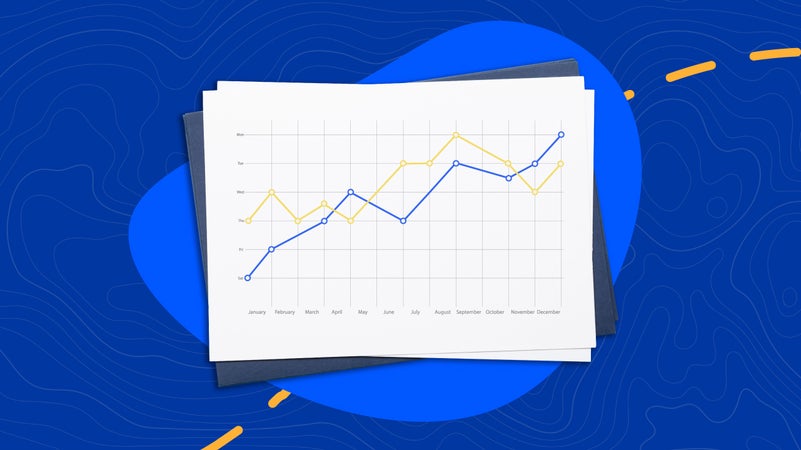What are the different types of index funds?

The Bankrate promise
At Bankrate we strive to help you make smarter financial decisions. While we adhere to strict , this post may contain references to products from our partners. Here's an explanation for .
Our writers and editors used an in-house natural language generation platform to assist with portions of this article, allowing them to focus on adding information that is uniquely helpful. The article was reviewed, fact-checked and edited by our editorial staff prior to publication.
Index funds are one of the most popular types of investments because of their simplicity, low cost and diversification benefits. In general, index funds seek to replicate the performance of an underlying index comprised of stocks or bonds, which means they aren’t managed by costly portfolio managers with teams of analysts.
There are various types of index funds available, each with its own unique strategy and focus. From broad market index funds to market cap index funds, there is a wide range of options for investors to choose from.
Here’s what you need to know about the different types of index funds.
Broad market index funds
Broad market index funds aim to capture the majority of an investable market, which could be stocks, bonds or other investable assets. While many index funds track a portion of the overall stock market, such as the large-cap or small-cap universe, total stock market index funds will include companies from both areas. Broad market index funds are great if you’re looking for low-cost exposure to an entire asset class or a specific country or region.
Here are a few of the top broad market index funds:
- Vanguard Total Stock Market ETF (VTI) – This fund aims to track the performance of the CRSP U.S. Total Market Index and holds stocks across the large-, mid- and small-cap universes as well as the growth and value investing styles.
- Schwab U.S. Broad Market ETF (SCHB) – This fund seeks to track the performance of the Dow Jones U.S. Broad Stock Market Index and provides exposure to the 2,500 largest publicly traded companies.
- Vanguard Total Bond Market ETF (BND) – This fund provides broad exposure to the taxable, investment-grade U.S. bond market, excluding inflation-protected and municipal bonds.
Market cap index funds
Market cap index funds invest based on specific market capitalization ranges. A company’s market cap is equal to the total value of its outstanding shares and companies can be divided up based on those values. Large-cap funds, such as funds that track the S&P 500, generally hold companies with market caps above $10 billion, while small-cap funds tend to hold companies with market caps below $2 billion. A fund focused on mid-caps would fall somewhere in between the two.
The following funds are focused on stocks with different market caps:
- Fidelity 500 Index Fund (FXAIX) – This fund invests at least 80 percent of its assets in stocks included in the S&P 500 index and falls into the large cap category.
- Vanguard Mid-Cap ETF (VO) – Aims to track the performance of the CRSP U.S. Mid Cap Index, which includes companies that fall into the mid-cap category.
- iShares Russell 2000 ETF (IWM) – This fund aims to replicate the performance of the Russell 2000 small cap index and provide diversified exposure to the U.S. small cap universe.
Equal weight index funds
Most stock index funds are weighted according to their market cap, which means companies that are worth the most will make up larger percentages of the fund’s portfolio. While this logically makes sense, it does create the risk that a company becomes overvalued and accounts for a significant portion of the fund’s assets. Equal weight index funds solve this issue by having each holding in the fund make up roughly the same percentage of fund assets. If a fund has 100 holdings, each one will account for about 1 percent of the portfolio.
Here are a couple of popular equal weight funds to consider:
- Invesco S&P 500 Equal Weight ETF (RSP) – This fund invests based on an equally weighted index of the S&P 500.
- Direxion Nasdaq-100 Equal Weighted Index Shares (QQQE) – This fund invests based on the Nasdaq 100 Index on an equally weighted basis.
Fixed income/debt index funds
While most people probably think of investing in stocks when they think about index funds, there are also many ways to invest in fixed income or debt through index funds. These funds track bond indices the same way that stock funds track well known stock market indices, allowing for the funds to charge low expense ratios compared to actively managed funds. Bonds can play an important role in your portfolio, especially during your retirement years.
Here are a few popular bond index funds:
- Vanguard Long-Term Bond ETF (BLV) – This fund aims to track the performance of the Bloomberg U.S. Long Government/Credit Float Adjusted Index and provide a high level of current income with high credit quality.
- iShares 1-5 Year Investment Grade Corporate Bond ETF (IGSB) – Seeks to track the performance of an index that’s made up of U.S. investment-grade corporate bonds with remaining maturities of between one and five years.
- Fidelity Municipal Bond Index Fund (FMBIX) – This fund invests at least 80 percent of its assets in securities included in the Bloomberg Municipal Bond Index and seeks to provide a high level of current income exempt from federal income tax.
Sector-based index funds
If you have a specific view on a certain area of the economy, sector-based index funds are going to be a great fit for your portfolio. These funds can be great for expressing an investment opinion, without having to do all the work of digging into individual securities. You might buy a fund based on the technology sector or a fund focused on financials could be interesting if you think rates will continue to rise.
Here are some examples of common sector-based index funds:
- The Consumer Discretionary Select Sector SPDR Fund (XLY) – Aims to track the performance of a consumer discretionary index, which includes companies involved in various areas of retail, hospitality and leisure, apparel and luxury goods and more.
- Fidelity MSCI Financials Index ETF (FNCL) – This fund tracks an index of financial companies that are involved in a variety of financial-related business activities such as banking, insurance and investment management.
- Vanguard Communication Services Index Fund (VOX) – Seeks to track the performance of an index that measures the return from stocks of companies that provide telephone, data-transmission, cellular, wireless communication services and offer related content through various media.
International index funds
Index funds can be an easy way to gain exposure to geographic areas outside the U.S. because you can purchase a diversified portfolio through a single fund. You may not be familiar with each company in the fund, but you may have a positive outlook for the country or region’s economy and are interested in putting a portion of your overall portfolio there. These international funds are simple ways to get access to economies in Europe or the Asia-Pacific region.
Here are some top funds to consider:
- Vanguard FTSE Emerging Markets ETF (VWO) – This fund aims to track the performance of the FTSE Emerging Markets All Cap China A Inclusion Index and invests in countries such as China, Taiwan, South Africa and Brazil.
- iShares Core MSCI Total International Stock ETF (IXUS) – This iShares fund seeks to match the performance of an index of non-U.S. equities across the market-cap spectrum. Invests in both developed and emerging international markets.
- Fidelity ZERO International Index Fund (FZILX) – This Fidelity fund comes with no fee and invests based on an index of global stocks that excludes the U.S.
Socially responsible index funds
Socially responsible index funds have become increasingly popular in recent years as investors care more about how their money is invested and not just their investment return. Some companies have increased their focus on environmental, social and governance issues and are included in indexes that track stocks with that appeal. Other indexes focused on socially responsible companies exclude certain companies because of their business activities. These companies, sometimes referred to as sin stocks, might be involved in the sale of firearms, alcohol and tobacco products, adult entertainment or gambling.
These ESG funds focus on socially responsible investing:
- Vanguard ESG U.S. Stock ETF (ESGV) – The Vanguard ESG U.S. Stock ETF tries to match the performance of the FTSE U.S. All Cap Choice Index and screens for certain ESG criteria. It excludes stocks from certain industries such as alcohol, tobacco, firearms, cannabis and gambling, among others.
- iShares Global Clean Energy ETF (ICLN) – This iShares fund seeks to track the performance of an index of global stocks from the clean energy sector. Companies in the fund produce energy from renewable sources such as solar and wind.
- SPDR S&P 500 Fossil Fuel Reserves Free ETF (SPYX) – This ETF gives investors focused on climate change exposure to the S&P 500 without holding companies that own fossil fuel reserves. It’s a great choice if you’re looking for a fairly traditional investment option with a slight focus on climate change.
Bottom line
Many financial experts recommend investing in index funds, but there are many different types to choose from. If you’re looking for one fund, it’s best to focus on broad market index funds because they’ll give you the most diversification in a single fund at a low cost. If you’re looking to build a portfolio of index funds, it might be worth looking at some of the different market cap funds or sector-based funds to incorporate your own views into your overall portfolio.
Editorial Disclaimer: All investors are advised to conduct their own independent research into investment strategies before making an investment decision. In addition, investors are advised that past investment product performance is no guarantee of future price appreciation.



